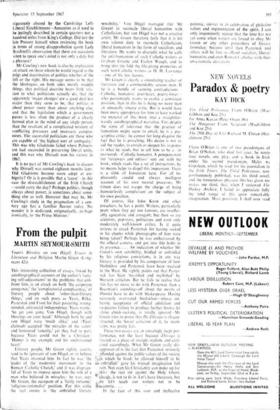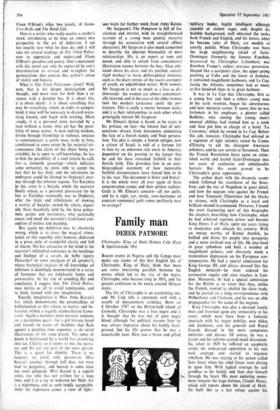The Third Policeman Hann O'Brien (N1 ac- Gibbon and Kee
25s) NEW NOVELS
Paradox & poetry
KAY DICK
Ice AnnaKavan (Peter Owen 30s) The Hangover Frank Sargeson (MacGibbon and Kee 25s) The 28th Day of kW Richard M. Elman (Hut- chinson 25s) Hann O'Brien is one of two pseudonyms of Brian O'Nolan, who died last year; he wrote four novels, one play, and a book in. Irish under his second pseudonym, Myles na Gopalecn, which he used for his journalism in the Irish Times. The Third Policeman, now posthumously published, was his third novel, and the tremendous pleasure this has given me makes me think that, when I reviewed The Dalhey Archive, I failed to appreciate fully the total range of this quite remarkable imagination. Most positively I shall now read 'Flann O'Brien's 'either Itifis novels',' AI • Swiin- Two-Birds and The Haid Life.
Here is a writer who really catches a reader's mind, introducing as he does an almost new perspective to the art of definition. I am not exactly sure what he does do, and it will take me several readings of The Third Police- man to appreciate and understand Flann O'Brien's paradox and poetry. One's excitement with this novel can only be expressed by one's determination to re-read and re-explore the permutations that contain this author's union of reality and fantasy.
What is The Third Policeman about? Well, now, that is for deeper investigation and thought, and more time for both than a re- viewer with a dateline has. It is about life, it is about death : it is about something that may be everything, which, in order to compre- hend, it may well be necessary to discard every- thing known, and begin with nothing. More simply, it is a personal story narrated by a man without a name, who yet has the possi- bility of many names. A man seeking wisdom, driven through friendship to violence, anxious to communicate; a gentle man, ready to love, conditioned to some extent by his material cir- cumstances (the claim of the object being in- evitable), he is open to self-knowledge; he has in him the possibility of a soul (whom he calls Joe—a clownish genealogy—which indicates some certainty), he exists only to accept the fact that he has died, and the adventures he undergoes could be likened to Orpheus's jour- ney through the infernal regions. The Eurydice in this story is a bicycle, which the narrator finally enjoys as a personal possession (to be lost as Eurydice eventually was to Orpheus), after the trials and tribulations of viewing a variety of bicycles owned by others, especi- ally those boastfully held by the three police- men, guides and instructors, who paternally cosset and maul the narrator's traditional con- ception of motive and meaning.
But, again, my definition may be absolutely wrong, which is to stress the magical stimu- lation of this superbly alert humour, delivered in a prose style of wonderful clarity and full of charm. No less attractive to the mind is the narrator's referential constancy to the teachings and findings of a savant, de Selby (query Descartes? or some amalgam of all savants?), whose hysterical analysis of all knowledge ad infinitum is dazzlingly demonstrated in a series of footnotes that are fabulously funny and provocative. At the risk of sounding flat and conclusive, I suggest that The Third Police- man invites us all to avoid conclusions, and to think instead with our imagination.
Equally imaginative is Miss Anna Kavan's Ice, which demonstrates the potentialities of hallucination as this relates to motive and be- haviour, within a vaguely science-fiction frame- work. Again a nameless male narrator ventures on a mysterious quest—for a girl known, loved and feared—in waves of incidents that flash against a puzzling time sequence. as do serial illustrations of the same dream. The sense of doom is heightened by a world fast dissolving into ice. Clearly, so it seems to me, the narra- tor and the girl are part of the same person.
This is a quest for identity. There is no humour, no relief, only pessimism. Miss Kavan's journey through hell does not even lead to purgatory, and heaven is some state not even glimpsed. Miss Kavan is a superb artist, one who has not written for a long time, and it is a joy to welcome her back. Ice is a nightmare, and .as such totally acceptable After the nightmare comes a view of light:
one ivaltS for further work froth. AMid Kavan.
Mr Sargeson's The Hangover is full of fas- cination and interest, with its straightforward account • of a young .man gaining maturity through his association with several offbeat characters. Mr Sargeson is also much concerned to describe the inherent bisexuality of most relationships. His is an expert at tone and mood, and able to switch from conventional illustration (scenes between the boy, Alan, edu- cated above his class, and his puzzled, socially rigid, mother) to loose philosophical notation, such as the diary entries of the town's corrupter of youth, an unpublished writer. With women, Mr Sargeson is not so much at a loss as dis- interested: the women are almost convention- ally inserted, and in the case of the older woman (not the mother) caricature spoils the por- traiture. This is really a matter between males, and it is their relationships to each other which principally interest Mr Sargeson.
Mr Elman's fiction is based, as he states in his preface, on fact—the known fact of anti- semitism—drawn from documents concerning the fate of a Jewish family and Nazi persecu- tion. The plot is simple; a Jewish refugee, now a citizen of Israel, is told of a fortune left to him by an unknown rich uncle in America, dependent on his proving to the lawyer that he and his have remained faithful to their Jewish faith. This provokes him to an auto- biographical statement of how inexorably faithful circumstances have forced him to be to his race. The document is bitter and brutal: it is the whole story all over again of those concentration camps and their pitiless realities. Guilt is Mr Elman's concern—all our guilts, and he is right, yet, surely, over-insistence on constant communal guilt comes perilously near to revenge?































 Previous page
Previous page